is one of my earliest memories of living through one of those cultural moments in which everyone becomes obsessed with the same movie months before anyone's actually seen it. Prior to its July 2, 1996 release, there were so many Independence Day commercials and trailers showcasing the stunning imagery of city-wide spaceships hovering over New York, LA and The White House. There were awesome taglines like "Earth. Take a good look. It could be your last." A newly bad-ass Will Smith looked determined to prove wrong anyone who would dare ask, "What's the Fresh Prince of Bel-Aire guy doing in an action movie?" The special effects looked amazing in a time in which many of us were still discovering what exactly special effects even were, at least outside of Star Trek and Star Wars (Independence Day did win the Oscar for Best Achievement in Visual Effects). Everyone I knew couldn't wait to see this movie.
We had then-40-year-old German director (Roland Emmerich) and then-33-year-old New York actor-turned-writer/producer (Dean Devilin) to thank. Independence Day, an unofficial update of War of the Worlds, was their homage to the extreme spectacle of the Lucas and Spielberg films they grew up adoring. They worked very hard to keep us entertained and not asking, "Jeff Goldblum just suddenly remembered he has a computer program that can beat the aliens?" or "Should I be wincing every time Harvey Fierstein and Judd Hirsch's respective gay/Jewish stereotype characters talk?" Independence Day easily became the second highest grossing film of all time to that point, with $306 million domestic and $817 million worldwide. A report from 1996 actually claimed that on its own Independence Day likely made "more money at the box office than the entire slate of films released in 1995 by Universal, Paramount and Sony combined."
And now a sequel is in production, due out just in time for the first film's 20th anniversary. Seemingly all the major players other than Will Smith are coming back (Jeff Goldblum, Bill Pullman, Judd Hirsch, Vivica A. Fox, even Brent Spiner) to be joined by franchise newcomers Liam Hemsworth, Charlotte Gainsbourg, Jessie Usher and now Maika Monroe from It Follows. Emmerich will again direct just as Devlin is again producing and co-writing. But how did we get from there to here? I'll let them tell the story in the following oral history I've put together, culled mostly from old Emmerich/Devlin interviews:
Germany's Little SpielbergRoland Emmerich went to film school in Munich in 1977, the same year Star Wars came out.
Roland Emmerich (Director, Co-Writer): I was blown away from the very first frame [of Star Wars]: you saw that small ship, and then the imperial cruiser kept getting bigger and bigger. For me, German movies were boring and dull, and everything that came from the new Hollywood was cool.
His 1981 graduation film was the most expensive student film in German history, earning him the nickname Das Spielberg aus Sindelfingen ("Little Spielberg from Sindelfingen"). Meanwhile, the New York-born Dean Devlin was a self-labeled "popcorn child of Hollywood" who'd moved to Los Angeles to be an actor.
Dean Devlin (Producer, Co-Writer): I had done the first season of LA Law and I had done a series called Hard Copy, and right after that I had taken a period where I wasn't acting for while - I had gone about six months without any work. I got an audition for a movie that was going to shoot in Germany called Moon 44. The director was in town and wanted to meet, and that's where we met. It was amazing, because I thought this was just going to be some goofy, direct-to-video movie and, frankly, I needed the dough - so I took it. But when I got to Germany, I saw the most beautiful sets I had ever seen, and Roland was fantastic with the camera, he was fantastic with the actors, and I thought, "Wow. This guy's the real deal." But at that point, his English wasn't quite as good as it is today, so some of the dialogue was rather stilted, so I asked Roland if it would be okay if I improv'ed some of my dialogue, and he said, "Great!" We started doing that and we were having a lot of fun working together, but then some of the other actors got pissed off because I suddenly had the best dialogue in the movie, and Roland said, "Would you mind rewriting some of their dialogue?" I said, "No, that'd be great." Then we started working together behind-the-scenes, and we had a great partnership. We made movies together for the next eleven years.
They landed their first Hollywood movie together in 1992 with Universal Soldier, starring Jean-Claude Van Damme and Dolph Lundgren.
Emmerich: I went to a video store and rented all of [Van Damme and Lundgren's] movies, which I shouldn't have done. I thought: 'We had to come up with a cool story because the guys can't act.' And so Dean and I conceived they both had to die, and then be reanimated as robots.
Their next project was Stargate with James Spader and Kurt Russell:
Devlin: Everyone thought we were nuts making Stargate. We thought we were nuts. The studio [MGM, which bought the film after completion] thought we were nuts. The actors thought we were nuts. And really, who's to blame them? We were the guys who just made a Dolph Lundgren movie [ Universal Soldier]."
"Hey, I Think I've Got Our Next Movie"At a foreign press conference for Stargate, Emmerich was asked if he believes in aliens (he doesn't) and when the room was surprised by his answer he had a moment of inspiration, telling the reporters:
Emmerich: Well, I don't believe in Santa Claus but he'd make a great movie. What if we woke up tomorrow morning and there were fifty-mile wide spaceships hovering above the city; it'd be the most incredible, momentous day in the history of mankind [pausing, turning to Devlin] Hey, I think I've got our next movie.
Devlin wasn't so sure.Devlin: I thought there had been so many movies about aliens coming to earth, and Spielberg had done it better than anyone. I could see what our movie was. He started to tell me the images he had in his mind and I started to get excited by the images but I still didn't have the movie.
Emmerich: I had these images in my head. I thought: 'I'll make them so big they won't be flying saucers anymore, they'll be huge ships, as big as cities.
Devlin: Roland and I went, there's no way of doing this movie and pretending nobody's ever done this. We can't pretend that we're inventing this. Let's have some fun with it, otherwise we're just going to be trying to ignore film history. Why not make it a movie for people who loved Star Wars and loved Spielberg movies and wanted these movies back?
"You Want to Blow up the White House?"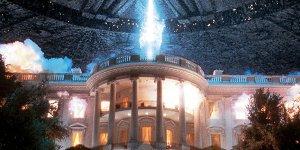
Devlin: We had had a lot of problems in the marketing of [ Stargate]. Real disagreements. Because the film had a different distributor in every country, some of them were able to do more of what we wanted and some of them weren't. It was frustrating, because every place where we liked the marketing, it did well, and where we didn't, it didn't.
As a result, the marketing weighed heavy on their minds while writing and pitching Independence Day:
Devlin: We gave [the script] to our agents on Wednesday, they sent it out to the studios by Thursday afternoon, by Thursday evening we had three offers, and by Friday every single studio had made an offer. We spent the entire day on Friday meeting with each studio, and a bidding war began and we put into the bidding war the ad campaign that we wanted, so that not only did you have to buy the movie, you had to agree to sell the movie in the way that we wanted to sell it. We pitched them the idea of this teaser and at the end of the teaser the White House blows up. 'Earth takes a good look-it could be your last.' We had the catch line 'The world ends July 4 th.' We didn't want to have our best shot to have a bad campaign.
As Emmerich and Devlin recall, their meeting with Fox went roughly like this:Fox Executives: You Want to Blow up the White House?
Emmerich: Everyone is frustrated with politics right now. They'll cheer it.
Fox Execs: Yes...but the White House?
Devlin: We would agree with you if it were a terrorist doing it, but it's...space aliens!
That workedDevlin: Fox stepped up on every level. By Monday morning we were in pre-production.
"The Countdown To The End Of The World"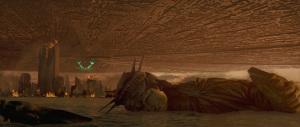
Volker Engel (Visual Effects Supervisor): I found out when we started working on Independence Day, I came to America and our production department seemed so grand: everyone seemed to know what they were doing. Yeah, right. What we encountered is that there is a lot of money but the money gets spent in the wrong directions. Because of the time pressures on these movies everything has to happen really fast and usually nobody really thinks what he's doing.
Engel farmed out the effects work for the film to six different companies. For the coveted White House explosion scene, they got Joe Viskocil, a miniature pyro expert who forever has a claim to fame as the man who really blew up the Death Star.Devil: We gave [Viskocil] a room where for nothing but three and a half months he did nothing but shoot explosions. He built up his library of fire and flame that was the most extensive ever created.
Emmerich: The first time [Fox] saw the shot [of Viskocil's miniature White House being blown up] they knew what the impact would be.
Tom Sherak (Fox's Head of Marketing): I had the feeling this was going to be a phenomenon; not a movie. A phenomenon!
This was still a time when actors weren't really used to the "emoting at nothing" reality of working in visual effects-heavy films:Bill Pullman (President Whitemore): I had real things around me, [yet when it came time to stare in horror at a spaceship the size of Washington, D.C.] we all looked up at different things for 15 minutes. We'd say, 'Are you looking at the telephone pole or that little gray thing? What is that gray thing?
Have You Thought About Changing the Title?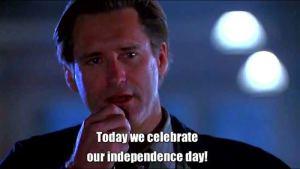
Devlin: We fought this very hard. And in fact the president's speech [in the movie] never said 'today we celebrate our Independence Day.' I literally ran onto the set that morning and added that line because we were in this fight with the studio over the release date. I didn't want to lose that date. I wanted to put our flag in the sand and say don't come near us!
Fox was still nervous about the July 2nd release, fearful of limiting the film to a 10-week release window (back when that seemed like a bad thing) since the Olympics were right around the corner in September. So, the marketing department went into overdrive, paying $1.3 million to run a trailer during the Super Bowl in January 1996:Devlin: The studio wanted to do something spectacular. And they came to us and said 'what do you think about Super Bowl Sunday?' From that moment on, that became the standard. You had to have it out on the Super Bowl.
Sherak: We knew right away that we'd grabbed people. Our phones were ringing off the hook, people were talking about it in restaurants. We accomplished what you always hope for-to hit everybody at once.
Still 7 months away from release, Devlin and Emmerich were falling behind on completing the 3,000 special-effects shots, telling EW at the time:Devlin: We're way within budget, but the feeling is we could use more...we've learned it's not enough for the good guy to win. The bad guy has to suffer, and we realize we don't have enough of that.
Emmerich: It's not very expensive to add the shots, and it depends on how well behaved you were the rest of the shoot.
Fox allowed them to up the production budget to just under $75 million, and they continued adding and finalizing visual effects shots for as long as they possibly could. The Toy Companies Didn't Get It
Devlin: The toy companies either didn't get it or their level of commitment wasn't where we thought it should be. Either they passed on us or we passed on them. We were ready to scrap the whole idea of a toy line [before St. Louis-based Trendmasters, best known for its Gumby and Tarzan toys, stepped in].
J Russell Hornsby (TrendMaster's Co-CEO): We saw the project as not just a niche science-fiction movie, which would've been a problematic sell, but as a big crowd-pleasing adventure movie. Kind of like Star Wars meets Top Gun with a little Alien thrown in.
Some Famous FansDevlin: As a kid I remember loving a movie and then being so disappointed because the toy was nothing like what I saw on the screen. I wanted this to be different.
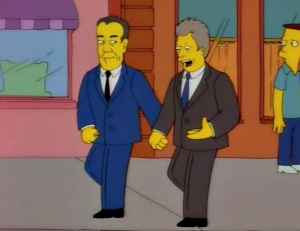
Emmerich: It was completely surreal. To watch the White House blowing up inside the White House? The most unreal moment of my career.
During Independence Day's opening weekend, President Clinton told a crowd in Youngstown, Ohio:
President Bill Clinton: Somebody said I was coming to Youngstown because this is the day the White House gets blown away by space aliens. I hope it's there when I get back.
Classic Slick Willy for ya'. His rival in 1996's Presidential Election, Senator Bob Dole, was less smooth, telling reporters after leaving an Independence Day screening:
He later co-opted the film's imagery as well as one of its taglines for a talking point on the campaign trail:Dole: I liked it. We won in the end. Bring your family, to be proud of. Diversity. America. Leadership. Good over evil.
Clinton won re-election quite easily. "In Six Months They're Going To Turn On You."Bob Dole: For far too long, President Clinton's economic policies have hovered like an alien ship over the American economy, blowing away growth and opportunity. In 1996, America strikes back!
Steven Spielberg invited Emmerich and Devlin to the set of The Lost World:
Spielberg also offered some sobering advice, which Devlin recalled as:Devlin: He had had his people make up three different versions of [an Independence Day amusement park] ride. While he's directing [ The Lost World], he's pitching us three different versions of the ride he'd like to do: one was in the spaceship with Jeff Goldblum, another one was in the town when it was attacked by aliens. Another was a virtual reality thing. They were incredible.
Steven Spielberg: Enjoy it, because in six months they're going to turn on you.
Devlin: How come?
Not that Spielberg had any experience with that kind of thing [Yes, I'm being sarcastic].Spielberg: Because in six months they're not going to remember the movie. They're just going to remember the hype, all the toys, the commercialization of your film, and they're going to forget the film.
Hezbollah issued a statement at the time calling Independence DayDon't Drag 9/11 Into This "propaganda for the so-called genius of the Jews and their alleged concern for humanity." They commanded the Muslims of Lebanon to boycott the movie, yet Lebanon became the film's second biggest market in the Middle East after Israel.Devlin: I thought maybe that was sour grapes, but six months later we were being called everything that's wrong with Hollywood. All that year, headlines were 'the year of the independent film,' because all the movies nominated for Oscars were independent movies [Best Picture Nominees: Braveheart, Apollo 13, Il Postino, Babe, Sense & Sensibility, though not all of those are indies]. But the reality is, when these movies do well, the studios are flush and when they're flush, they're willing to take chances on more interesting films. In Europe it was so misunderstood. The American government throughout the years has so angered 80% of Europe that by the time our movie came out every single place I went to promote the movie the first question was: 'Don't you think this movie is promoting the idea that America is the world policeman?'
Jeff Goldblum: I think Hezbollah missed the point: the film is not about American Jews saving the world; it's about teamwork among people of different religions and nationalities to defeat a common enemy.
Invariably, after the terrorist attacks on 9/11 some were reminded of the disaster imagery from films like Independence Day.
Getting the Story Idea While Doing an Interview...AgainNeal Gabler ( New York Times Reporter): American films now reach every corner of the world and their images colonize the imaginations of virtually everyone-one reason Muslims hate America. You have to believe at some level 9/11 was their rebuff to Hollywood as their triumph over it-that they could out-Hollywood Hollywood. This was the terrorists' own real-life disaster movie-bigger than Independence Day or Godzilla or Armageddon.
Joe Viskocil (The Miniatures Expert Who Blew Up ID4's White House): [When I watched the 9/11 attacks on TV] I thought to myself: 'I have done these shots.' I felt guilty about making my work look so good, and I felt like shit. I really did. I couldn't leave my condo for two weeks. I went out for good and I couldn't look people in the face. I started thinking maybe I did my job too well, and it might have been the nucleus of an idea for somebody to say, 'Hey, let's crash a plane into the White House.' I thought, 'Oh my God, what have I done?'"
Devlin: After September 11, there were a lot of interviews that [Roland and I] did basically because the imagery looked so similar, and it was so frightening to see things that were fantasy in a movie look so much like these horrible images of reality. As we were doing interviews about it, we were actually saying that the more interesting parallel of Independence Day was how the world came together in the aftermath. How people who had been arguing stopped arguing and started working together. I think our world did the same thing. Shortly before September 11, China was suddenly our enemy and there was a huge war of words between us and China. Right after September 11, we're holding hands trying to fight terror together. I think a lot of Americans were doing that.
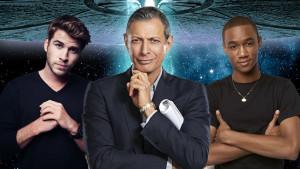
Devlin: Roland and I have always said that we didn't want to do a sequel to just do a sequel of that movie. That movie meant a lot to us, and we thought if we ever did one, it would have to be as original to the first film as James Cameron's Aliens was to the first one. So we put a pretty high standard on what kind of story we would do. We didn't want to just remake the first movie again [But as we gave all those interviews after 9/11] and started talking about [the tragedy bringing the world together] aspects, a story popped up and Roland and I got very excited and said, "Wait a minute... finally we have a story that's interesting." We're developing that story and hopefully sometime in the next year or so we can write it down as a script, and if the script comes out good we definitely will do the sequel.
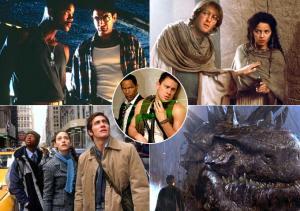
Devil: It was a wonderful cast [for the first film], and they're really terrific people. I mean, I've been blessed. I haven't had the egomaniac star yet in any of my films. It's always been a pleasure. And that film - which had over 200 speaking roles - we didn't have an ego in the bunch. It was a really unique experience. In fact, Will Smith really kind of led that down-to-earth attitude on the set. He was the guy who was willing to stand out in the sun, in baking heat, and be his own stand-in while the cameras were being set up. He was such a trooper during the making of the picture.
Yet not everyone is happy with Independence Day' s legacy:
Tom Shone (Film Critic/Journalist): Independence Day kicked off a cycle of nineties disaster movies, returning the blockbuster to exactly the sort of large-spectacle, multicast extravaganzas from which Jaws had once delivered audiences. If Jaws had radically downsized its threat level to a single shark, then ID4 radically upsized its threat level to include global catastrophe. If Jaws had lowered its heroism levels to the scruffy low-slung heroism of ordinary men, ID4 upscaled to presidents, pilots and other national paragons. And-most importantly of all-if Jaws had sought out comic relief in the singular spectacle of Richard Dreyfuss then ID4 's joshing tone expanded to swallow the entire cast [...] ID4 ushered the blockbuster into its late, decadent, self-parodic camp phase.
Independence Day 2 is currently due out next summer (June 26, 2016) with a potential Independence Day 3 due out a year after that.
Sources: Tom Shone's Blockbuster: How Hollywood Learned to Stop Worrying and Love the Summer, New York Times (Hezbollah controversy)(Timeline), (Toys), EW (last minute shots), IGN (Devlin's 2002 comments)

